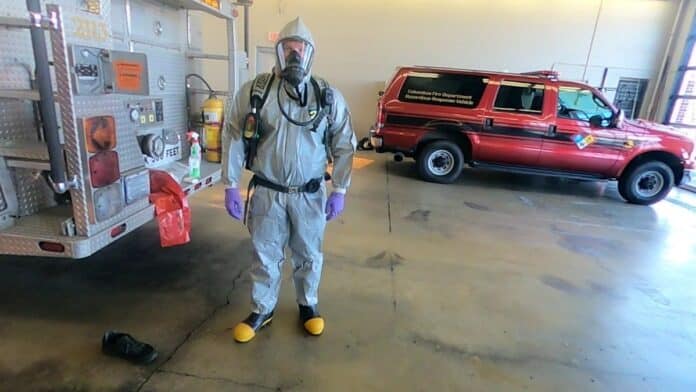
First responders here say they have sufficient personal protective equipment for now as they navigate emergency calls during the COVID-19 pandemic. It’s the "for now" part that has them concerned.
"Eventually, if this thing grows and multiplies as they are predicting, we will run short," said Columbus Township Fire Chief Dave Thomaspons. "Shannan Hinton at Bartholomew County Emergency Management is working hard to get us more — but it’s hard to find."
What’s needed? Thompson said first reponders need gowns, masks, gloves, respirators, safety glasses and more.
And the scarcity of these items is affecting smaller fire departments and agencies around the county who have even less than city- and county-funded first responders.
[sc:text-divider text-divider-title=”Story continues below gallery” ]Click here to purchase photos from this gallery
"None of the 10 rural fire departments have the proper equipment," said Southwest Bartholomew Volunteer Firefighters Chief Billy Koons. "All of us are low on gowns and face shields."
And since it’s unknown how long the pandemic will last, even the largest and best supplied first-responders have no idea how long their supplies will last as well.
Whenever rural departments have been in need of emergency supplies in the past, several fire chiefs have turned to Hinton, who is the emergency management director. Her contacts and grant-writing abilities have been invaluable to the departments, volunteer firefighters said.
Along with her deputy director, Natalie Ferrenburg, Hinton said she have spent much time over the last few weeks attempting to secure personal protection equipment.
"But the earliest shipping dates we’ve been able to find is in the middle of June – for everything," Hinton said.
Even then, there is no guarantee Bartholomew County will receive the gowns, masks, gloves, face shields or eye wear that they need, even in June.
"We need this protective gear whenever we are assisting emergency medical technicians," Koons said. "All we can do is follow every protocol and procedure we can to stay safe."
A national shortage
Hinton says the COVID-19 pandemic has created a national shortage where all 50 states are hitting the same vendors seeking the same equipment.
Luckily, some companies are suspending their normal production to begin making what the country needs to address this health threat, Hinton said.
"There are others operations being put into place, so we’re talking with them to see if they can help us," Hinton said. "We’re trying all the avenues we can think of to get supplies in for everyone as quickly as possible."
"We have to realize that while we have COVID-19, there are other parts of the country in a much worse situation," said Chief Deputy Sheriff Maj. Chris Lane of the Bartholomew County Sheriff’s Department. "While we need to stay quarantined and take other precautions, most of this (protective gear) is going to go where it’s needed the most when it’s finally distributed."
Law enforcement personnel have the same reasons as everyone else to be concerned because the virus is invisible, Lane said.
Nevertheless, it’s imperative that police, deputies and state troopers maintain a calm and cool demeanor, Lane said.
"If law enforcement shows they are afraid, what type of fear will that spread to the public?" Lane asked. "We’re trying to keep an upbeat and positive attitude, and we’re just asking the public to try to do the same."
The sheriff’s department currently has a sufficient supply of protective personal equipment, he said.
But if the pandemic continues as long as some health officials have predicted, those supplies are going to dwindle, the chief deputy sheriff said.
"We could get behind the 8-ball pretty fast," said Lane, who added both he and jail commander Maj. John Martoccia have put in several hours attempting to secure protective gear on their own.
But one of the most important steps that law enforcement can take is to follow strict protocols and avoid unnecessary risk, Lane said.
For example, all reports on activities not involving an active crime in progress are being taken over the telephone, by the sheriff’s department and the Columbus police.
And if officers or deputies are sent out on a call, the dispatcher will ask questions of the person requesting assistance regarding the virus, Lane said. Those who are considered a "positive screen" are calls where the protective equipment is mandatory.
"We’re not only protecting ourselves, but we are also protecting the public by avoiding unnecessary contact," Lane said. "We could be a carrier and not even know it."
Officers are also asked to self-monitor their health before coming into work, and to stay home if they are showing COVID-19 symptoms, he said.
Sanitizer supplies
At this time, the Columbus Fire Department appears to be well-supplied, according to public information officer Capt. Mike Wilson. The department has obtained plenty of gloves and masks, largely through donations from the Chinese Association in Columbus and other city departments.
The department is also receiving large donations of hand sanitizers from three different businesses: garb2ART Cosmetics of Columbus, Hard Truth Distilling Co. in Nashville, and Huber’s Starlight Distillery in Clark County, Wilson said. The Bartholomew County Sheriff’s Department received a hand sanitizer donation from Cardinal Distillery in Bloomington. The businesses have also donated to other first responders.
"But the biggest concern we have right now for the long term is getting cleaning supplies," said Wilson.
Firefighters at each of the city fire stations are using a large amount of disinfectant cleaning hard surfaces and equipment on an on-going basis. "If there is a significant increase in positive screenings, it could quickly reduce the amount of supplies we have on hand," Wilson said.
The Columbus Fire Department has had one firefighter test positive for the virus.
Columbus police have also been issued protective gear such as masks, respirators, latex gloves, eye protection and sanitizer, according to CPD spokesman Lt. Matt Harris.
Sam’s Club has donated several containers of sanitizing wipes to city police officers, while Bear Wallow Distillery of Nashville has agreed to provide hand sanitizer, Harris said. While the police spokesman says his department has what they need to keep themselves safe, the officers know they are facing a potential health risk whenever they are dealing with the public.
"The possibility of picking up the disease and passing it on unknowingly to a member of your own family is definitely a concern," Harris said. But it was also a concern before COVID-19 with other bloodborne pathogens like HIV and hepatitis."
Columbus police have stopped doing physical roll calls in order to avoid having a large number of people in one room, Harris said.
While the doors of the entrance to the sheriff’s department aren’t locked like those for the Columbus Police Department lobby, signs are posted urging the public not to enter the building unless it’s an emergency. Once inside the lobby, all doors that lead to other parts of the building are locked.
Jail precautions
When a person is booked into the Bartholomew County Jail, there are other protocols that must be followed, Lane said. First, the person in custody is asked questions such as whether they have traveled abroad recently or been around anyone who might have the virus. After the questions, the person must have their temperature taken, Lane said.
If the new inmate shows any symptoms of COVID-19, he or she is immediately transported to Columbus Regional Hospital, the chief deputy sheriff said. The inmate must receive a clearance from the hospital’s medical staff before they can be returned to jail, Lane said.
"Even after they are cleared and transported back to jail, we put them in a different area of the jail apart from the general population," Lane said. "They will stay there for 14 days to see if they develop any symptoms. After that, they can join the general population of the jail."
While visitation at the jail has been suspended, there is one positive side to the current health crisis, Lane said. Due to self-quarantines, the daily jail population is now running between 190 to 200, rather than the usual 240 to 250, he said.
Heightened protocols
Another first-responder – the Emergency Medical Services division of Columbus Regional Health – has adopted what they described as heightened protocols, CRH spokeswoman Kelsey DeClue said.
All ambulances and personnel have all equipment recommended by the Centers for Disease Control and Prevention, she said. Emergency 911 dispatchers are screening all ambulance calls, and if there is a potential COVID-19 patient, only a limited number of health care staff are allowed to go in with personal protective equipment, she said.
"Other responders are asked not to approach the patient, in order to lower the risk," DeClue said.
The patient is masked before being placed in the ambulance and taken to the hospital, she said.
When asked whether Emergency Medical Services plans to designate COVID patients-only ambulances, DeClue said administrators don’t believe that’s a necessary step at this time.
"What we do is treat every run like we have transported a COVID patient," DeClue said. "They are disinfected after every run by scrubbing them from top to bottom."
[sc:pullout-title pullout-title=”How to help ” ][sc:pullout-text-begin]
In the wake of the COVID-19 crisis, most rural Bartholomew County fire departments are in need of personal protection equipment such as protective gowns, masks, gloves, face shields or eye wear. If the contributor chooses, such donations can be dropped off at individual rural firehouses.
But all donors are strongly urged to contact Bartholomew County Emergency Management first before making their contribution, director Shannan Hinton said.
By calling first, donors can learn specifically what items or gear are in most need to help the most people, Hinton said. Arrangements can also be made on how the donor can best proceed to help others in the community, she said.
The Emergency Management telephone number is 812-379-1680.
[sc:pullout-text-end]




